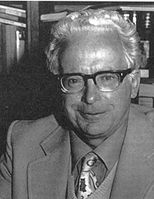Jan Willem de Jong
| PersonType | Category:Authors of English Works Category:Professors Category:Translators |
|---|---|
| FirstName / namefirst | Jan |
| LastName / namelast | de Jong |
| namemiddle | Willem |
| MainNamePhon | Jan Willem de Jong |
| bio | J. W. de Jong was born in Leiden. He attended primary school and gymnasium in Leiden, and went on to study at the University of Leiden from 1939–1945, where he began his lifelong study of the "canonical languages" of Buddhism: he took Chinese as his major, while minoring in Japanese and Sanskrit. With the closing of the university in 1940 following the German invasion of the Netherlands, de Jong was forced to continue his studies on his own. With the war's end in 1945, the university reopened and de Jong passed his candidaatsexamen. In 1946, he traveled to the United States as a visiting professor at Harvard University, where he continued his study of Sanskrit texts.
From 1947-1950, he lived in Paris, studying at both the Sorbonne and the Collège de France, where he began studying Tibetan. While still in Paris, he met his future wife Gisèle Bacquès, whom he married in 1949. That same year, he was awarded his PhD from the University of Leiden; his doctoral thesis was a critical translation of Candrakīrti's Prasannapadā. He also began studying Mongolian. He returned to the Netherlands in 1950 to act as senior research assistant (1950–1954) and continuing academic employee (1954–1956) at the Univ. of Leiden, working at the university's Sinologisch Instituut; in 1956, he became the first Chair of Tibetan and Buddhist Studies when the position was created at the Insituut Kern (the Indological institute at the Univ. of Leiden). In 1957, de Jong founded the Indo-Iranian Journal with Univ. of Leiden colleague F. B. J. Kuijper in 1957 in order to facilitate the publishing of scholarly articles in Indology. In 1965, he moved to Australia to become professor of Indology at the Australian National University in Canberra, a position he held until his retirement in 1986. De Jong became a corresponding member of the Royal Netherlands Academy of Arts and Sciences in 1978. De Jong is well known for his amazing linguistic ability having had a command of Dutch, French, English, German, Chinese, Japanese, Russian, Danish, Mongolian, Sanskrit, Pāli, and Tibetan, as well as the rather acerbic quality of his reviews. His scholarly publications number more than 800; 700 of these are reviews. He made major contributions to the field of Tibetan studies, including a study of an account of the life of Milarepa by Tsangnyong Heruka Rüpägyäncän (Gtsang-smyon he-ru-ka rus-pa'i-rgyan-can) (1490), and the editing and translation of all Dunhuang fragments apropos of the Rāmāyaṇa story in Tibetan. Furthermore, his work on Madhyamaka philosophy in the 1940s is some of the earliest to treat that topic in detail. De Jong died in Canberra. In April 2000, some 12,000 items from his personal library (which itself contained over 20,000 volumes) was purchased from his family in Canberra by the University of Canterbury in Christchurch, New Zealand. (Source Accessed Mar 17, 2020) |
| YearBirth | 1921 |
| YearDeath | 2000 |
| BornIn | Leiden, Netherlands |
| phduniversity | University of Leiden |
| education | Ph.D. University of Leiden. A Critical Translation of Candrakīrti's Prasannapadā. |
| IsInGyatsa | No |
| Other wikis |
If the page does not yet exist on the remote wiki, you can paste the tag |
Full Name
Jan Willem (J. W.) de Jong (1921–2000)
Other Information
- Wikipedia entry
- Biography of J. W. de Jong
- Bibliography of late Prof. Dr. J. W. de Jong
- Ruegg, David-Seyfort. “In Memoriam J. W. de Jong” Indo-Iranian Journal 43.4 (2000): 313-317.
- Kuiper, F.B.J.. “Jan Willem de Jong” Indo-Iranian Journal 43.1 (2000): xi-xii.
- H. W. Bodewitz and Minoru Hara, eds. Gedenkschrift J. W. de Jong. (Studia Philologica Buddhica 16). Tokyo: The International Institute for Buddhist Studies, 2004.

